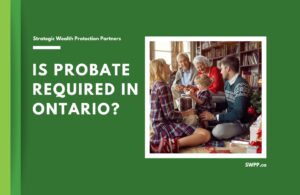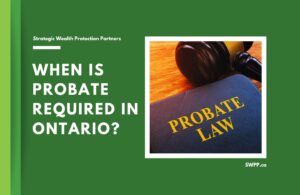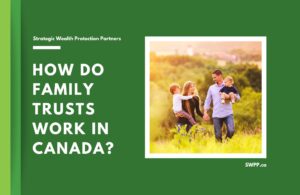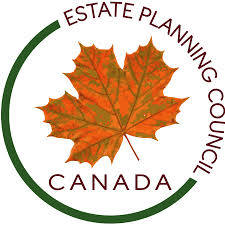Written by Ron Cooke, President & Founder of Strategic Wealth Protection Partners in Ontario, CEA®, Member of the Estate Planning Council Canada
How Much Is an Estate Taxed in Canada?
In Canada, there is no direct estate or inheritance tax, but estates can still face significant taxation.
Understanding how estates are taxed can help beneficiaries minimize costs and preserve their inheritance.

How are estates taxed in Canada?
In Canada, estates are primarily taxed through capital gains tax and income tax rather than a direct estate tax.
Upon death, the Canada Revenue Agency (CRA) treats all assets as if they were sold at fair market value, triggering capital gains tax on investments, real estate, and certain assets.
Additionally, registered accounts like RRSPs and RRIFs are taxed as income in the year of death unless transferred to a spouse or dependent child. Probate fees may also apply, depending on the province.
If you don’t do careful estate planning, taxes on your estate could add up.
Is there capital gains tax on estates in Canada?
Yes, capital gains tax applies to estates in Canada.
When someone passes away, their non-registered assets (such as stocks, investment properties, and businesses) are considered “deemed disposed,” meaning they are taxed on the increase in value from the time of purchase to the date of death. It’s as if all the assets were sold the day that the owner died.
50% of the capital gain is taxable, and the amount is added to the deceased’s final income tax return.
However, it’s important to note that the principal residence exemption can eliminate capital gains tax on a primary home.

How much can you inherit without paying taxes in Canada?
There is no inheritance tax in Canada, meaning beneficiaries do not pay tax simply for receiving an inheritance.
However, the estate itself may have tax obligations before assets are distributed. For example, if you inherit cash, there is no tax owed, but if you inherit a house or investments, future capital gains or income from those assets may be taxable.
How much tax do you pay on inherited property in Canada?
If the inherited property was the deceased’s principal residence, there is no capital gains tax.
However, if it was a rental property, cottage, or investment property, the estate must pay capital gains tax on the property’s increased value from the time of purchase to the date of death. If the beneficiary later sells the property and its value has increased, they will owe capital gains tax on the appreciation from the time they inherited it to the time of sale.
Estate planning strategies such as trusts and spousal rollovers can help minimize these taxes.
Avoid Ontario’s Hefty “Death Tax”
While Ontario doesn’t have a direct estate tax on your total net worth, income tax on capital gains and deemed dispositions can have a significant impact on your estate. These taxes can dramatically reduce the wealth you pass on to your loved ones.
For instance, assets like real estate (excluding your principal residence) and non-registered investments are deemed sold at fair market value upon death. The resulting capital gains are usually taxed at Ontario’s highest marginal tax rate, which exceeds 53.53% (2024).
Here’s an example: If you have an RRSP or RRIF worth $1,000,000, the government could take $535,000 in taxes upon your death. That’s more than half of your hard-earned savings—gone to taxes, not your family. And that’s before factoring in additional costs like probate fees, executor fees, legal fees, and accounting fees. What will be left for your family?
Did you know that some of your assets may even face double taxation? Without proper planning, the total financial burden on your estate could be staggering.
Simple Steps Can Save You Millions
With our Living Estate Plan, you can not only minimize taxes but also protect and even grow your wealth.
Our proven strategies help shield your assets, ensuring more of your legacy goes to your loved ones—not the government.
Discover How to Minimize Taxes and Secure Your Legacy
Did you know that without a solid estate plan, taxes and fees in Ontario could claim a significant portion of your wealth?
If you’ve worked hard to build your business, investments, and properties, protecting your legacy for your loved ones is critical. At Strategic Wealth Protection Partners, we specialize in helping high-net-worth individuals in Ontario secure their financial futures.
Our Living Estate Plan is designed to:
- Reduce estate taxes and probate fees.
- Simplify wealth transfer to your loved ones.
- Reflect your values and priorities in every detail.
Your Legacy Matters
With our personalized guidance, we’ll help you navigate options like Living Trusts to protect your assets and ensure your family’s peace of mind. Contact us today to book your Living Estate Plan Consultation and take the first step toward a secure future.
Schedule a Living Estate Plan Consultation
Planning your legacy is about more than numbers—it’s about ensuring your family remembers you and your values are honoured for many years to come.
Estate planning and trusts can feel overwhelming, especially if it’s your first time. That’s why we’re here.
With our simple, 5-Step Living Estate Plan, we make the process easy, helping you create a comprehensive estate plan or trust that protects your assets from taxes and probate fees while preserving your legacy. Tools like The Final Word Journal capture your story, wishes, and essential details like accounts and end-of-life plans, ensuring your family has clarity and comfort.
Take the first step today—schedule a consultation call and give your family the ultimate gift: peace of mind and the assurance they were always your priority.
Read More
If you’re starting your estate planning process, you may find these articles helpful:
- How Much Can You Inherit Without Paying Taxes In Canada?
- How to Avoid Inheritance Tax on a House in Canada
- Do Trusts Pay Taxes in Canada?
- How to Avoid Estate Tax in Ontario
- How to Avoid Inheritance Tax in Canada
About the Author
RON COOKE, PRESIDENT & FOUNDER OF STRATEGIC WEALTH PROTECTION PARTNERS

With over 30 years in financial services, I’ve seen the challenges families face when a loved one passes—lost assets, unnecessary taxes, and emotional stress. That’s why I created the Living Estate Plan, a comprehensive process to protect assets, eliminate estate and probate fees, and create legacies that are remembered for many years to come.
This plan ensures your family receives not just your wealth, but a meaningful reminder of your care and love. Tools like The Final Word Journal capture your story, wishes, and essential details, offering clarity and comfort during difficult times.
Your final gift should be more than money—it should be peace of mind, cherished memories, and an organized estate.
Schedule a Call
Schedule a 30-minute consultation call with Strategic Wealth Protection Partners.
Click HERE to schedule a consultation.









